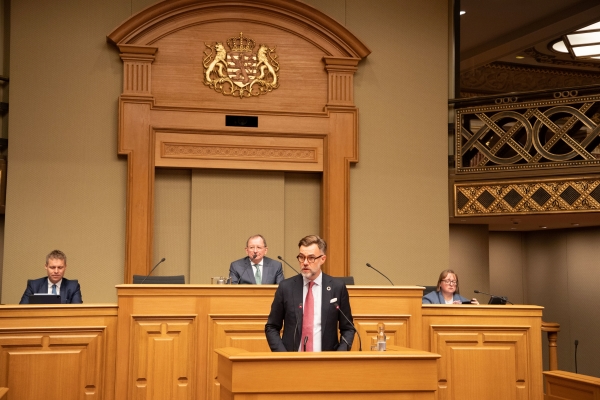 Credit: chd.lu
Credit: chd.lu
On Tuesday 15 November 2022, Luxembourg's Minister for Cooperation and Humanitarian Action, Franz Fayot, delivered his analysis of the challenges of Luxembourg Cooperation to the Chamber of Deputies (Luxembourg's parliament).
The war in Ukraine and food insecurity
The Minister opened his speech by evoking the impact of the Russian war of aggression in Ukraine, in particular on Luxembourg's development cooperation partners around the world. So, after the COVID-19 pandemic had already caused major setbacks in poverty, nutrition, education and security in many developing countries, war has pushed millions more on the verge of starvation.
In this context, Minister Fayot underlined the reinforced efforts that Luxembourg Development Cooperation has undertaken to deal with food insecurity, both in its humanitarian action, to combat acute hunger, and in development cooperation projects, to make food systems more resilient in the long term. While Luxembourg has already invested around €40 million in sustainable agriculture and access to food in 2021, this amount will rise to more than €60 million in 2022, which represents more than 10% of Official Development Assistance (ODA).
Humanitarian action
Minister Fayot also addressed the challenges arising in the humanitarian field, as well as the response of Luxembourg Development Cooperation to this situation. With no less than 274 million people in need of humanitarian assistance and protection according to the United Nations, Luxembourg is committed to devoting at least 15% of its ODA to humanitarian purposes in the future. This commitment is part of the new Humanitarian Action strategy published in 2022, which will enable Luxembourg Humanitarian Action to act in a more targeted and effective manner around six strategic priorities, six horizontal themes and 50 action points.
In order to make greater use of Luxembourg's assets and expertise in terms of innovation and humanitarian action, Minister Fayot also announced that Luxembourg will host the first edition of an international acceleration programme (Humanitarian Innovation Accelerator) in June 2023, organised in collaboration with the World Food Programme, which will aim to find and develop new solutions to humanitarian emergencies.
Bilateral cooperation
Minister Fayot then took stock of activities at the level of bilateral cooperation. It is clear that the situation is unstable in many partner countries of Luxembourg development cooperation. This is particularly evident in the Sahel region, where the many crises linked to climate change, malnutrition and the security context are cumulative. While Senegal and Niger remain reliable partners despite growing insecurity and the implementation of indicative cooperation programmes (ICP) continues as planned, the situation in Burkina Faso, which suffered two military coups in 2022, and in Mali remains a concern. In both countries, development cooperation will continue on the basis of transition strategies. In this context, the Minister underlined that the safety of staff on site was an absolute priority and that the Ministry of Foreign and European Affairs ensured at all times that the necessary security measures were taken.
Minister Fayot also presented the future direction of bilateral development cooperation. Thus, given the difficult situation in many partner countries and with the aim of diversifying Luxembourg's cooperation activities on the African continent, Luxembourg will intensify its relations with Rwanda and Benin. Here, the projects will aim in particular to promote the rule of law and good governance, sustainable agriculture and food security as well as improved access to inclusive finance for the benefit of farmers. In Central America, a reorientation is taking place after Luxembourg ended its bilateral development cooperation relations with Nicaragua in 2019. Thus, further regional cooperation will be promoted, as will stronger collaboration with Costa Rica which will support this triangular and South-South cooperation development. Luxembourg is thus following the example of other Member States of the European Union, which also operate from San José.
Human rights
During his speech, the Minister recalled the importance that the Luxembourg Development Cooperation attaches to respect for human rights in all its interventions. In order to strengthen its commitment and its impact in this area, the Luxembourg Development Cooperation plans to increase in the future the budget allocated to projects that specifically promote the protection of human rights.
In this context, Minister Fayot announced that human rights, like food security, will be priority subjects during the Cooperation Conference to be held in December.
Non-governmental development organisations
Highlighting the important role played by non-governmental development organisations (NGDOs) in the implementation of cooperation for sustainable development, the Minister announced that Luxembourg Development Cooperation will strengthen its support for NGDOs. It will thus strengthen its contribution to covering their actual administrative costs by increasing the ceiling taken into account from 14% to 15%.
Estimates
At the end of his statement, Minister Fayot presented the estimates to members of Parliament. Despite the economic situation, it is likely that ODA will for the first time exceed €500 million.








